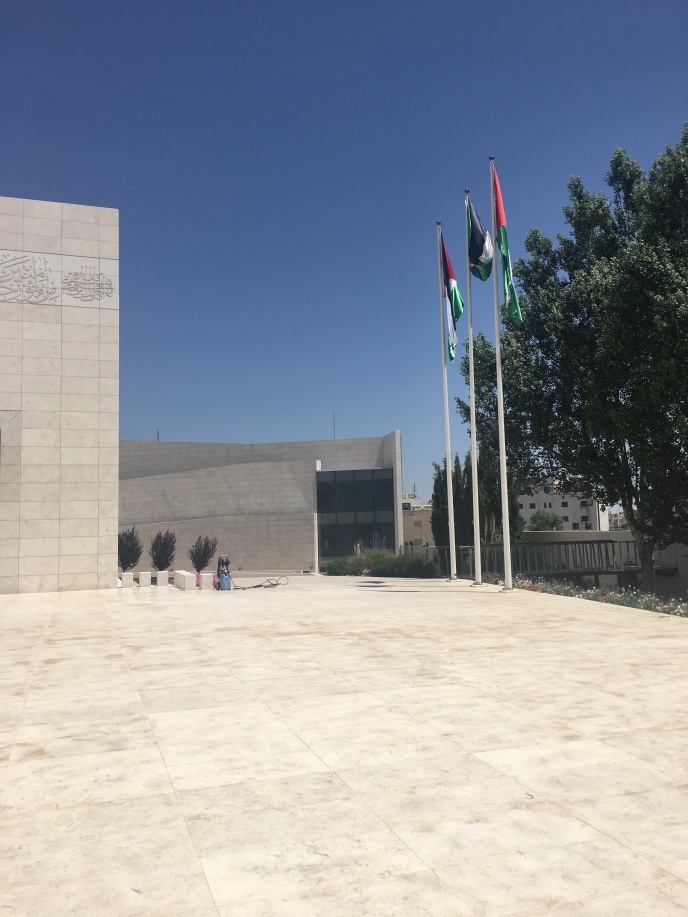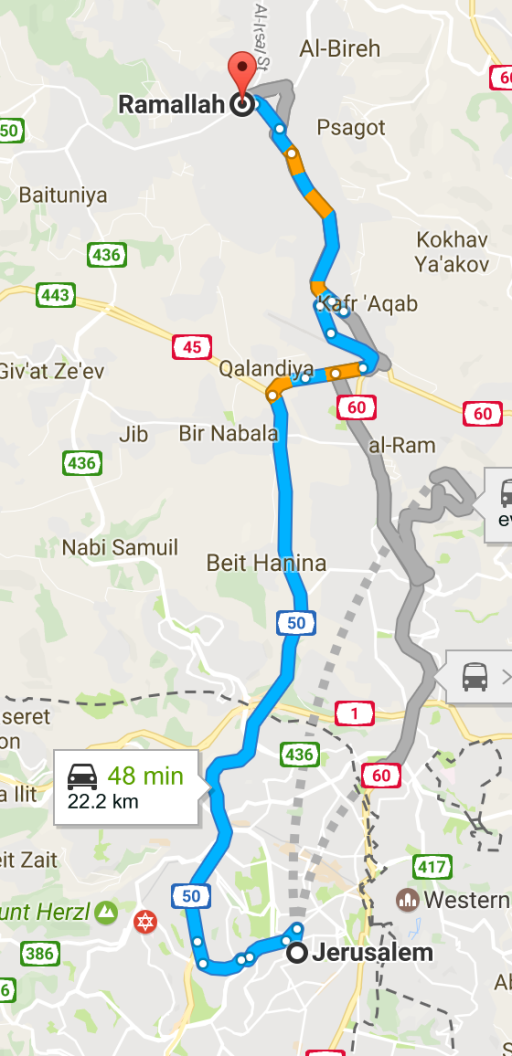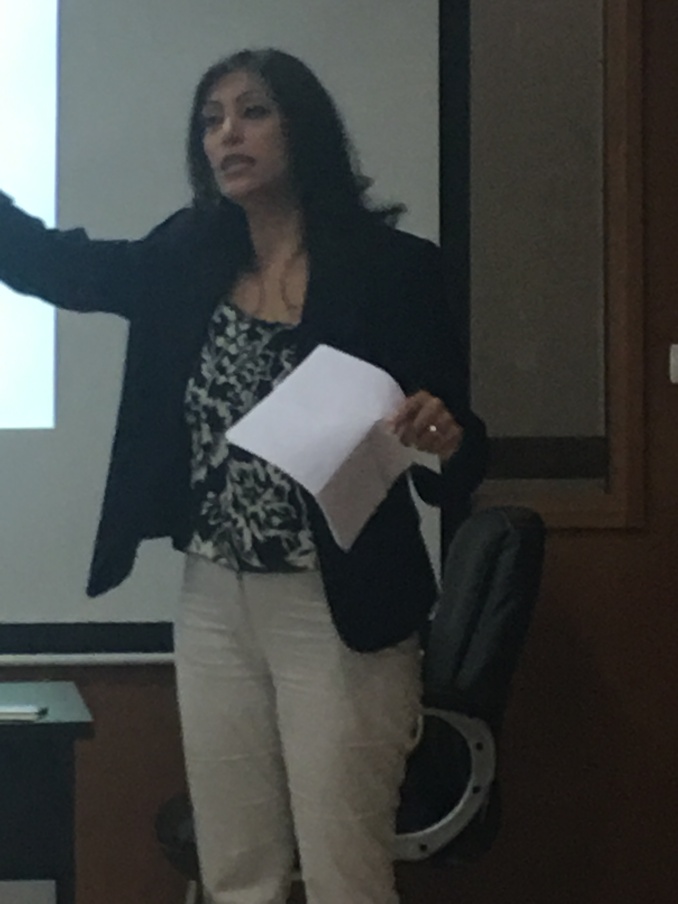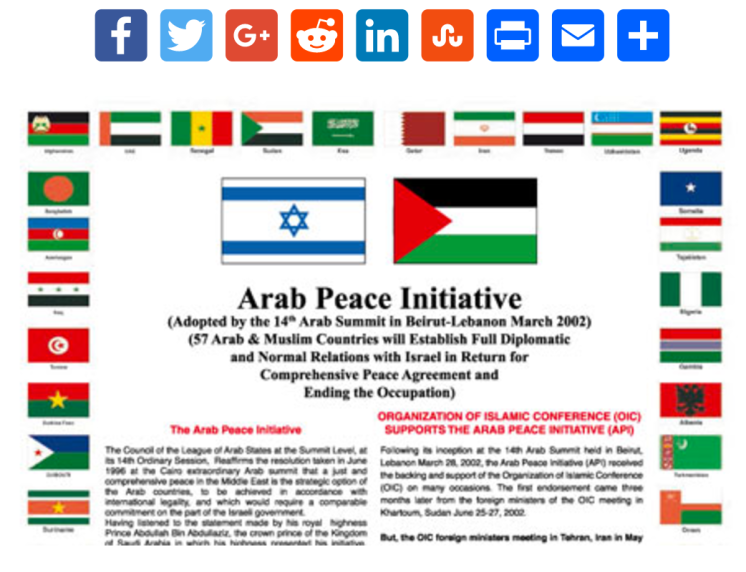Day Fifteen – A Meeting with the PLO
Day Fifteen – A Meeting with the PLO

I must admit, walking up the the offices of the national headquarters of the Palestinian Liberation Organization (PLO) in Ramallah was a bit surreal. For many years, the PLO was, to the West, synonymous with terror all that is was wrong in the Middle East. In recent years, the Organization has changed, according to their own pronouncements, although many in the West wonder how deep and sincere this change might be. Even still, the walk up to the headquarters was a bit unnerving:

This entry from Wikipedia does a nice job of succinctly summarizing the history and development of organization:
The Palestine Liberation Organization (PLO) (Arabic: منظمة التحرير الفلسطينية; ![]() Munaẓẓamat at-Taḥrīr al-Filasṭīniyyah (help·info)) is an organization founded in 1964 with the purpose of the “liberation of Palestine” through armed struggle, with much of its violence aimed at Israeli civilians.[5][6][7][8][9][7][10][11] It is recognized as the “sole legitimate representative of the Palestinian people” by over 100 states with which it holds diplomatic relations,[12][13]and has enjoyed observer status at the United Nations since 1974.[14][15][16] The PLO was considered by the United States and Israel to be a terrorist organization until the Madrid Conference in 1991. In 1993, the PLO recognized Israel’s right to exist in peace, accepted UN Security Council resolutions 242 and 338, and rejected “violence and terrorism”; in response, Israel officially recognized the PLO as the representative of the Palestinian people.[17]
Munaẓẓamat at-Taḥrīr al-Filasṭīniyyah (help·info)) is an organization founded in 1964 with the purpose of the “liberation of Palestine” through armed struggle, with much of its violence aimed at Israeli civilians.[5][6][7][8][9][7][10][11] It is recognized as the “sole legitimate representative of the Palestinian people” by over 100 states with which it holds diplomatic relations,[12][13]and has enjoyed observer status at the United Nations since 1974.[14][15][16] The PLO was considered by the United States and Israel to be a terrorist organization until the Madrid Conference in 1991. In 1993, the PLO recognized Israel’s right to exist in peace, accepted UN Security Council resolutions 242 and 338, and rejected “violence and terrorism”; in response, Israel officially recognized the PLO as the representative of the Palestinian people.[17]
Note the highlights:
- Founded in 1964
- Their purpose: Liberate Palestine through armed struggle
- Much of their violence aimed at Israeli civilians
- Recognized by over 100 countries (including the US) as the sole legitimate representative of the Palestinian people
- Changed to recognize Israel’s right to exist in peace
- Accepted UN Security Council resolution 242:
- Emphasizing the inadmissibility of the acquisition of territory by (1967) war and the need to work for a just and lasting peace in which every State in the area can live in security.“
- Accepted UN Security Council resolution 366 which:
- “Calls upon all parties to present fighting to cease all firing and terminate all military activity (related to the “Yom Kippur” War) immediately”and “Decides that, immediately and concurrently with the cease-fire, negotiations start between the parties concerned under appropriate auspices aimed at establishing a just and durable peace in the Middle East.”
We traveled to the headquarters of the PLO in the West Bank city of Ramallah (about 15 miles north of Jerusalem):

and began our time with a visit to the tomb of Yasser Arafat, founder and long time leader of the PLO.
We traveled to the headquarters and were greeted by this sign in the foyer:
 Yasser Arafat on the left; Mahmoud Abbas, current leader of PLO, on the right
Yasser Arafat on the left; Mahmoud Abbas, current leader of PLO, on the right
We met with Samar Awadallah, Communications Advisor and Director of Media and Communications for the PLO in a conference room at PLO.

Samar divides her time between two topics: the history of the current conflict from a Palestinian perspective and current status of the negotiations with Israel. [NOTE: As I’ve written in the past, the following is her account and perspective as she presented to us]
Historic Perspective
Samar showed maps that show the shrinking extent of occupied Palestinian land – from 100% to 22% (the current amount of land occupied by the Palestinians)
There have been numerous violations of International Law by the Israelis
- Building settlements
- Home demolitions’
- Forcible displacement
- Military raids
- Killing’
- Land confiscating
- Stealing resources
- Settler attacks
Palestinians have consistently, according to Suma, negotiated in good faith; however, negotiations have always broke down because of the “bad faith” negotiation posture of the Israelis: The paradigm: “Blame the Palestinians”
- Clinton
- Promised a “generous offer”
- No offer came
- Do not believe that the two-state offer was neither just or fair; a compromise made to give dignity to children a future
- Israel blamed Palestinians
- The Bush “Road Map” to peace
- Palestinians accepted road map
- Broke down because Israel negotiated in bad faith
- Israel blame Palestinians
- John Kerry’s initiative
- Promised a release of Palestinian prisoners as a “good faith” gesture.
- No release of Palestinian prisoners
- Blame Palestinians when negotiation broke down.
Recent developments
Samar sees the negotiations as a part of a Regional settlement, that is, the conflict between the Israelis and Palestinians must be seen as a part of a larger Arab-Israeli conflict:
- Outside-In
- Arab-Israeli Track
- Palestinian-Israeli Track
The Arab Peace Initiative

Samar mentioned the Arab Peace Initiative (API), sometimes called the Saudi Initiative which contains the following:
1. Requests Israel to reconsider its policies and declare that a just peace is its strategic option as well.
2. Further calls upon Israel to affirm:
a. Full Israeli withdrawal from all the territories occupied since 1967, including the Syrian Golan Heights to the lines of June 4, 1967 as well as the remaining occupied Lebanese territories in the south of Lebanon.
b. Achievement of a just solution to the Palestinian refugee problem to be agreed upon in accordance with U.N. General Assembly Resolution 194.
c. The acceptance of the establishment of a Sovereign Independent Palestinian State on the Palestinian territories occupied since the 4th of June 1967 in the West Bank and Gaza strip, with east Jerusalem as its capital.
3. Consequently, the Arab countries affirm the following:
a. Consider the Arab-Israeli conflict ended, and enter into a peace agreement with Israel, and provide security for all the states of the region.
b. Establish normal relations with Israel in the context of this comprehensive peace.
4. Assures the rejection of all forms of Palestinian patriation which conflict with the special circumstances of the Arab host countries.
5. Calls upon the government of Israel and all Israelis to accept this initiative in order to safeguard the prospects for peace and stop the further shedding of blood, enabling the Arab Countries and Israel to live in peace and good neighborliness and provide future generations with security, stability, and prosperity.
6. Invites the international community and all countries and organizations to support this initiative.
7. Requests the chairman of the summit to form a special committee composed of some of its concerned member states and the secretary general of the League of Arab States to pursue the necessary contacts to gain support for this initiative at all levels, particularly from the United Nations, the security council, the United States of America, the Russian Federation, the Muslim States and the European Union.
Samar believes that this initiative is a fair foundation for peace and shows Arab-Palestinian good faith.
Discussion

We asked Suma her sense of negotiations, why they have never resulted in a peace accord. According to Suma, Israelis objection to the peace plans are unreasonable and demonstrate their unwillingness to negotiate in good faith.
We then talked, at length, about Suma’s work, specifically her role preparing the Palestinian team for their negotiations with Israel. Her responsibility is to provide documentation, maps, and technical support for the team and is not responsible for negotiation strategy.
Suma talked about the Palestinian perspective of the PLO. She noted that the Palestinians “hate us” (her words), because of the little (if any) progress they have made in advancing their rights or securing a peace with Israel.
A final point, she stated that the key issue in the peace process, from the PLO perspective, is the “right of return” which would include either:
- A physical return to Israel for the Palestinian refugees, and compensation for their expulsion from their land
- Staying where Palestinians currently reside, with compensation
- Moving to another Arab land, with compensation.
Summary
Our presenter was decidedly cordial, eager to share her perspective on the conflict. She kept referring to the initiatives that the PLO has made over the course of negotiations with Israel, seeking peace and the opportunity for Palestinian flourishing. Her belief is that Israel doesn’t truly want peace and that the status quo is sufficient for them is at conflict with what we have heard from others, but there might be some in Israel who, if pressed, might agree.
In our debrief, we discussed several aspects of Suma’s presentation and noted the following:
- The change in the posture of the PLO over the years, from a aggressively militaristic organization at the onset to one that has (apparently) moderated its stance towards Israel and negotiation – although there are some who doubt the sincerity of this change.
- The insistence on a just solution to the refugee problem (which is problematic for Israel because of the demographic imbalance it could cause)
- A Palestinian homeland with full sovereignty rights, including security rights (which is problematic for Israel because it could lead to a hostile Arab country on their Eastern border)
With the conclusion of this visit, we have now with with representatives of all the major “players” in the conflict – except one: The United States. On to Tel Aviv and a meeting at the U.S. Embassy.
g




